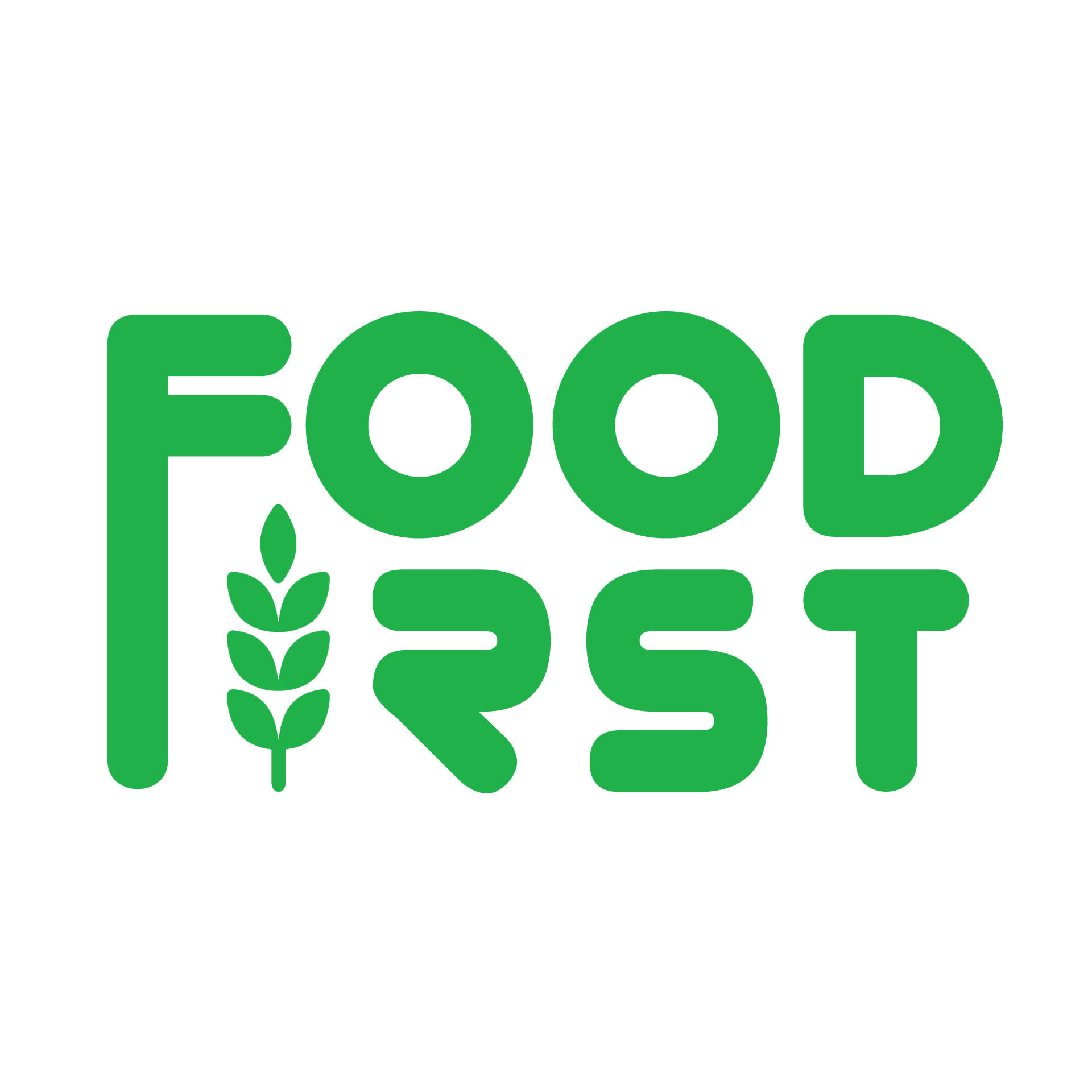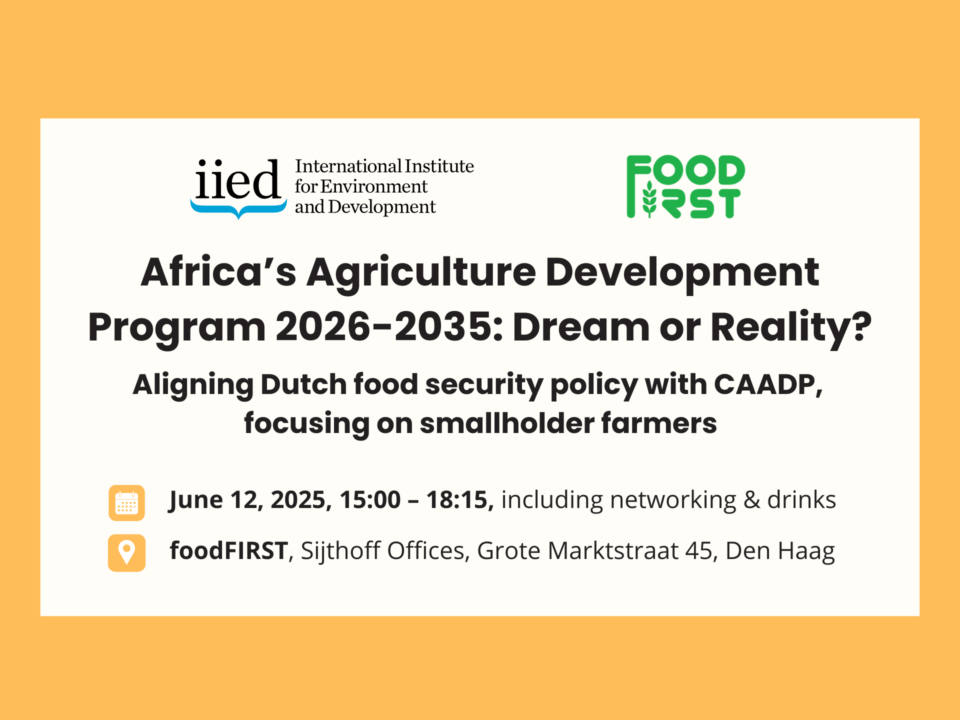Agricultural development in Africa in the light of covid-19 from a geopolitical perspective
foodFIRST deep dive session June 4, 2020
On Thursday, June 4, a deep dive webinar on Agricultural development in Africa in the light of covid-19 from a geopolitical perspective – which is a follow-up on the geopolitics and Africa session convened on December 18, 2019. Held in partnership with the Netherlands Food Partnership (NFP), this session explored the role of the Netherlands, in an EU context, in strengthening the diplomatic relationship and relevance of the EU in Africa as footprints from other global powers (China and USA) increase. In addition, the session delineated ways in which the covid-19 pandemic has affected agriculture and food security across all stages of the value chain in Africa. The aim was to discuss and answers important questions regarding: what does a geopolitical frame mean for Dutch activities in Africa? This question firstly relates to current activities; do we continue them, stop them, or redesign them, giving them a new rationale? In particular with the covid-19 pandemic, this question becomes more urgent. And, secondly, what should be the parameters of a new, decompartmentalized and geopolitically informed Africa policy, especially regarding food and agriculture?
The first speaker was Dr Louise van Schaik from the Clingendael Institute & Planetary Security Initiative speaking about food security and geopolitics in Africa. She began by briefly analysing the effects of the Corona pandemic in Africa. According to Imperial College, 300.000 – 3.6 million deaths are expected to occur in Africa because of the pandemic. However, the biggest impact is not the loss of lives but the effects of lockdown and global economic depression on Africa’s economy, food security and importation. The second point raised was the interrelationship between African food security and geopolitics. She noted that some of the current dilemmas include food aid vs. long-term sustainable food production, intensive agriculture or small-scale agriculture, agricultural production for foreign livelihoods (cocoa, coffee, tea) or local nutrition, and global value chains or self-sufficiency. Third, food security and conflict on the African continent was discussed as in many areas of unrest, starvation is often utilised as a war weapon, despite several international agreements against this practice.
The fourth topic of discussion was China’s presence in Africa and its impacts on EU-AU relationship. Compared to China, the EU has much bigger investments in aids in Africa while China contributes significantly more to infrastructural development. Reciprocity and equality are often at the centre of the distrust between EU and AU relations considering the sanctions imposed by the EU on numerous African countries due to violations of Human Rights judged by European standards.
The second speaker was Akin Akinyoade from the African Studies Centre, Leiden, speaking about reciprocity of EU-AU partnership. The five key areas of AU-EU relation include i) the green transition and energy access, ii) digital transformation, iii) sustainable growth and jobs, iv) partnership for peace, security and government, and v) partnership on migration and mobility. To achieve these, four (4) task forces were set up. One was on rural Africa that provides expertise, advice, and recommendations to strengthen the EU-AU partnership in the food and farming sectors. On the issue of equality, an example of a flower production value chain was used to illustrate the unequal AU-EU relationship. Stating that the value chain for flowers comprises three (3) important groups namely, the breeders (mostly French, Dutch and German companies – who enjoy the most financial gain), the propagator and the growers (75% of whom are Kenyan farmers). Several African breeding companies have tried entering the breeder group and have been impeded by lack of know-how, gatekeeping of intellectual properties and intensive capital required. This kind of skewed relationship questions the reciprocity of EU-AU relations when one side benefits and in some cases restricts the other side from doing the same. In summary, the dichotomy in the benefits acquired by the EU and the AU in trade relations has caused the EU to lose its geopolitical credibility and influence in Africa.
During the Corona crisis, China was at the forefront of the fight against covid-19 in Africa. Hence, increasing trust for China albeit EU is Africa’s largest investor and trade partner. To repair the EU-AU relationship, Dr Akinyoade advised transparency, joint action, mutual exchange, and the need for Europe to stop dictating Africa’s human rights standards.
Questions were answered about the ways in which the EU can contribute more to infrastructure developments in Africa without infringing on African states’ sovereign rights. To which the speakers replied that the EU must find a balance between propagating adherence to human rights laws and offering partnerships deals that fully imbibe the ideals of financial, economic, and diplomatic reciprocity. Current activities must be redesigned to re-establish the enervating trust that currently exists between the EU and the AU. The speakers identified that the food and agriculture sectors are one that can be used to reinforce this trust, as there has been little to no contribution in these sectors by competing global powers – emphasizing that the AU must be treated as equal partners.
The first speaker was Dr Louise van Schaik from the Clingendael Institute & Planetary Security Initiative speaking about food security and geopolitics in Africa. She began by briefly analysing the effects of the Corona pandemic in Africa. According to Imperial College, 300.000 – 3.6 million deaths are expected to occur in Africa because of the pandemic. However, the biggest impact is not the loss of lives but the effects of lockdown and global economic depression on Africa’s economy, food security and importation. The second point raised was the interrelationship between African food security and geopolitics. She noted that some of the current dilemmas include food aid vs. long-term sustainable food production, intensive agriculture or small-scale agriculture, agricultural production for foreign livelihoods (cocoa, coffee, tea) or local nutrition, and global value chains or self-sufficiency. Third, food security and conflict on the African continent was discussed as in many areas of unrest, starvation is often utilised as a war weapon, despite several international agreements against this practice.
The fourth topic of discussion was China’s presence in Africa and its impacts on EU-AU relationship. Compared to China, the EU has much bigger investments in aids in Africa while China contributes significantly more to infrastructural development. Reciprocity and equality are often at the centre of the distrust between EU and AU relations considering the sanctions imposed by the EU on numerous African countries due to violations of Human Rights judged by European standards.
The second speaker was Akin Akinyoade from the African Studies Centre, Leiden, speaking about reciprocity of EU-AU partnership. The five key areas of AU-EU relation include i) the green transition and energy access, ii) digital transformation, iii) sustainable growth and jobs, iv) partnership for peace, security and government, and v) partnership on migration and mobility. To achieve these, four (4) task forces were set up. One was on rural Africa that provides expertise, advice, and recommendations to strengthen the EU-AU partnership in the food and farming sectors. On the issue of equality, an example of a flower production value chain was used to illustrate the unequal AU-EU relationship. Stating that the value chain for flowers comprises three (3) important groups namely, the breeders (mostly French, Dutch and German companies – who enjoy the most financial gain), the propagator and the growers (75% of whom are Kenyan farmers). Several African breeding companies have tried entering the breeder group and have been impeded by lack of know-how, gatekeeping of intellectual properties and intensive capital required. This kind of skewed relationship questions the reciprocity of EU-AU relations when one side benefits and in some cases restricts the other side from doing the same. In summary, the dichotomy in the benefits acquired by the EU and the AU in trade relations has caused the EU to lose its geopolitical credibility and influence in Africa.
During the Corona crisis, China was at the forefront of the fight against covid-19 in Africa. Hence, increasing trust for China albeit EU is Africa’s largest investor and trade partner. To repair the EU-AU relationship, Dr Akinyoade advised transparency, joint action, mutual exchange, and the need for Europe to stop dictating Africa’s human rights standards.
Questions were answered about the ways in which the EU can contribute more to infrastructure developments in Africa without infringing on African states’ sovereign rights. To which the speakers replied that the EU must find a balance between propagating adherence to human rights laws and offering partnerships deals that fully imbibe the ideals of financial, economic, and diplomatic reciprocity. Current activities must be redesigned to re-establish the enervating trust that currently exists between the EU and the AU. The speakers identified that the food and agriculture sectors are one that can be used to reinforce this trust, as there has been little to no contribution in these sectors by competing global powers – emphasizing that the AU must be treated as equal partners.

